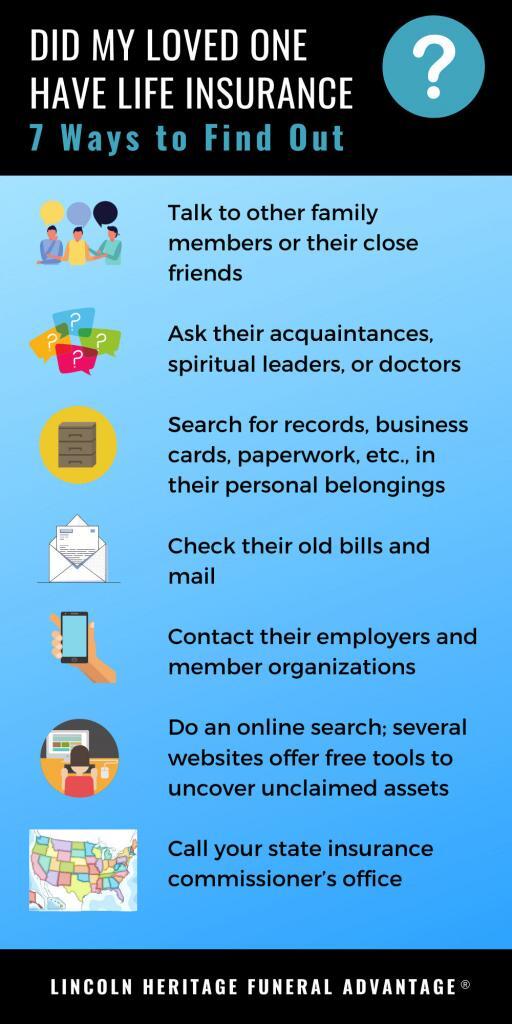How To Find Out If Someone Has Life Insurance

Our guide explains everything you need to know about how to find out if someone has life insurance. If you’re unsure if someone has or had a policy, there are ways to find out, including looking at personal belongings, doing an online search, and contacting the Insurance Commissioner’s office in your state.
Table of Contents
How to Find Out if a Life Insurance Policy Exists After Death
There are many things you need to do when a spouse or loved one dies. One of your top priorities will be finding ways to pay for the funeral and other final expenses, including insurance policies. Taking these steps can help you find the important documents you need.
Talk to Friends, Family Members, and Acquaintances
It’s important to know how to find out if someone has life insurance when they pass away. It’s one of the first things to do when someone dies. If you are unsure whether the deceased had a life insurance policy, talk with people outside of the immediate family. Sometimes, it’s easier to talk to people you’re not as close to about subjects related to death and dying. For that reason, your loved one may have confided about their benefits in friends, spiritual leaders, doctors, or social groups they were a part of (such as book clubs or exercise groups).
Search Personal Belongings
If your loved one had a policy, there is likely some record of it amidst their personal belongings. Check paperwork in his or her home and business. Accessing safe deposit boxes can be more difficult, and requirements vary by state. In most cases, you’ll need to have the key to the box, as well as a copy of the death certificate. You will also need proof of relation — a marriage certificate or executor’s testament, for example — and a photo ID. If you do not have the key, there may be an extra fee to drill into the box. Once opened, bank officers can deliver life insurance documents to named beneficiaries, but other contents must remain in place until a will or estate plan is executed.
Even if there is no record of the policy itself, there are other documents that may give you some clues:
- Business cards of insurance agents, attorneys, accountants, or financial advisors can connect you to potential contacts who may have helped secure a policy.
- Bank statements or cancelled checks may show payments to life insurance companies.
- Address books and planners may have useful contacts.
Check Old Bills & Mail
Life insurance companies will continue to send premium notices and updates via mail and/or email, so be sure to check your loved one’s mail and email. Credit card and other financial statements may also help you find out if a policy exists.
Contact Employers and Member Organizations
Contact past and present employers, as well as professional and social organizations of which your loved one was a member. Many people receive free or low-cost policies through work or as a member benefit. Even if your loved one was retired or no longer active in these groups, the policy could still be in place.
Do an Online Search
Several websites offer free search tools to help users find unclaimed assets, including death benefits. Simply type your loved one’s name into the search box at any of the following sites:
- National Association of Insurance Commissioners - Life Insurance Policy Locator
- MissingMoney.com
- National Association of Unclaimed Property Administrators - Unclaimed.org
There are also companies who will search for a lost policy for your loved one, and they can be a helpful resource for how to find out if someone has life insurance. Representatives will contact hundreds of life insurance companies on your behalf to determine whether your loved one had a policy. Fees vary, and scams involving this type of service do exist, so do your research before you go this route.
Call Your State Insurance Commissioner’s Office
If you haven’t had any luck locating a policy, get in touch with the Insurance Commissioner in your state. The National Association of Insurance Commissioners’ website lists the contact information for each state office. When an authorized person makes an inquiry to a policy, the state office typically forwards the request to licensed agencies within the state. The agencies will perform a search and, if a contract is found, will then make contact. If the person making the request is not an authorized party, the agency will not contact him or her, but will attempt to contact the named beneficiary.
Does Your Living Relative Have Life Insurance?
Though the best way to figure out if your relative has coverage is to ask him or her, there are some situations where it’s not an option. For example, if your loved one lives with dementia or mental illness, he or she may not be able to tell you the status of his or her coverage. The same may be true if your relative has been injured in a sudden accident or unforeseen medical emergency. If you need to know if your living relative has life insurance, you should follow the same steps listed above.

FAQs
Who can request information about a life insurance policy?
Even after death, companies must protect the privacy of their clients. In most cases, next of kin and policy beneficiaries can request information about a policy, but they may need to provide proof to the insurance company.
What information do I need to make a claim?
To make a claim, you will need several pieces of documentation:
- deceased’s full name, including maiden name
- Social Security Number (SSN)
- death certificate
- proof of your relation and/or identity
To start the process, simply contact the life insurance company that issued the policy and they’ll provide you with instructions.
What happens to the death benefits if no one claims the money?
Insurance companies turn over unclaimed death benefits to the state’s unclaimed property office. This is usually the office of the State Treasurer. The National Association of Unclaimed Property Administrators’ website lists this contact information by state.
Can you be the beneficiary of a life insurance policy and not know it?
Yes, you can. There is no requirement to notify a person when you list him or her on a policy.
It’s important to know how to find out if someone has life insurance if you’ll be responsible for settling their estate or paying any of their final expenses, including their funeral. The easiest way, of course, is to ask your loved ones. If that’s not an option, the steps above can help you find the critical documents you need.


